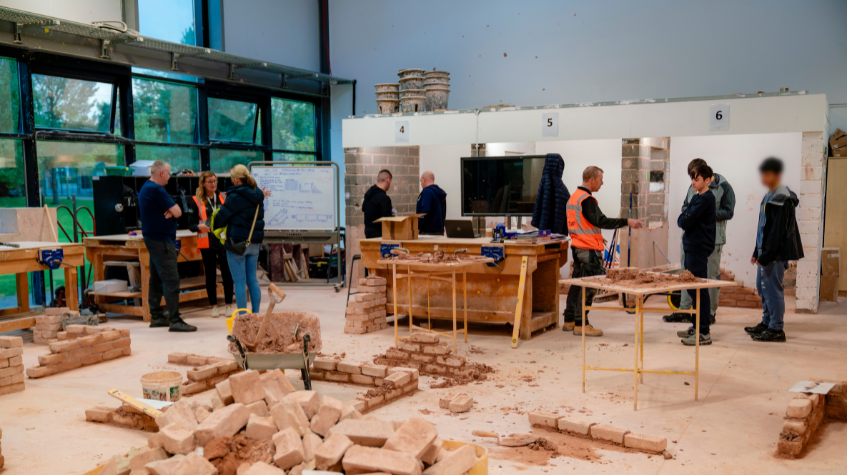
How to Get the Most Out of Your Industry Placement
If you are studying a T Level or one of our Transition courses, you should already be familiar with the concept of an extended work placement, known as an Industry Placement.
Around 33% of teenagers between 16-18 do a work placement, a period of time built into their college course, where they spend time gaining valuable work experience with an employer linked to their subject area and chosen career path.
But what’s in it for you and how can you make the most of your placement? A work experience placement is your chance to get a feel for your chosen industry and build your CV. Let’s break it down.
Why Industry Placements Matter
Real Opportunities for Real Career Progress
Well, most of our employer partners have been working with The Manchester College for several years, providing these extended work experience placements to level 2 and level 3 students, and there have been some brilliant success stories, with many offering paid employment, degree apprenticeships or remaining career mentors for the students they have hosted on placement.
If you’re wanting a hand-on course with lots of opportunities for experience, find out more about our T-Level courses.
Hands-On Work Experience That Makes a Difference
The great thing about an industry placement is that, because of the length of time you spend with the employer (315 hours on a T Level or 105 on a T Level transition), you will:
- Gain hands-on industry experience
- Build a professional network
- Develop your employability skills
- Learn how your college studies apply in real-world settings.
You’ll gain hands-on industry experience and specialist knowledge to really complement what you are learning at College and bring it to life.
How to Get the Most Out of Your Placement
Prepare Like a Pro
Do your research: read up on the organisation you will be working for (their website is a good place to start) and think of some questions you can ask about the company. This will show your interest and motivation when you meet the employer – especially if there is a selection process or interview involved.
Plan your journey: make sure you plan your travel route in advance and find out at least two ways/different modes of transport to get there so that you don’t arrive stressed on the first morning.
Check the company’s dress code: depending on your subject area, you will have T Level PPE or workwear. If you find yourself in an office situation, needing smart clothes, and don’t have any – College can help: Speak to one of the teams at the bottom of this article for further support.
Set Your Goals
Review your placement objectives on Grofar (you should have this on your phone) and with your placement coordinator, so you know what skills you need to focus on developing. Your coordinator will check in with you and your employer at regular intervals to support you and is the first point of contact for any issues.
Act Like a Professional
It’s important to remember that this is a realistic working environment, and you are therefore expected to behave like an employee – That means:
- Be punctual and reliable
- Follow all health and safety protocols
- Call your line manager or mentor if you're unwell
- Demonstrate the 7 DEAL behaviours we value at The Manchester College.
Keep Track of Your Progress
Via your Grofar app, keep a log-book; a kind of diary in which you record the tasks you do each day, what you learned and anything you feel could be improved. This acts as a digital portfolio that can be revisited to help you when applying for jobs in the future.
Make a Great Impression
Always show a positive, cooperative attitude. If you finish the tasks you are set, show initiative and ask whether you can help someone else. Greet work colleagues with a smile and get to know them a little – they can all be good contacts in the future.
Ask for a Reference
Just before your placement finishes, ask your employer mentor whether they will act as a referee for you on your CV and if so, get their full name and email address.
What to Do After Your Placement
Reflect and Update
Reflect on what skills you practised on placement, what tasks you carried out and make sure your logbook is complete. Then update your CV with the work experience you have gained, using your log-book to help you.
Successfully completing an industry placement, and showing enthusiasm and commitment to the process, really can open doors for you in future. Employers prefer candidates with plenty of work experience who know how to act in the workplace.
Behavioural skills, such as the 7 identified in ‘The Deal’ are just as important, if not more, than the technical skills you learn in the classroom and only with both will you succeed in your career.
Read about some of the successes that our students have had from their Industry Placements.
Why Choose The Manchester College
At The Manchester College, we don’t just offer courses - we prepare you for a future career. With exceptional tutor support, an unrivalled range of course subjects, and incredible industry placement opportunities, we’re committed to helping every student reach their full potential.
Our expert staff provide personalised career advice and are there to guide you every step of the way - from the classroom to the workplace. Whether you’re aiming for university, an apprenticeship, or straight into employment, we’ll make sure you’re confident, skilled, and ready for whatever comes next.
Start your journey with us and take the first step toward a bright future. Contact us for career advice and enrol onto one of our courses today.
